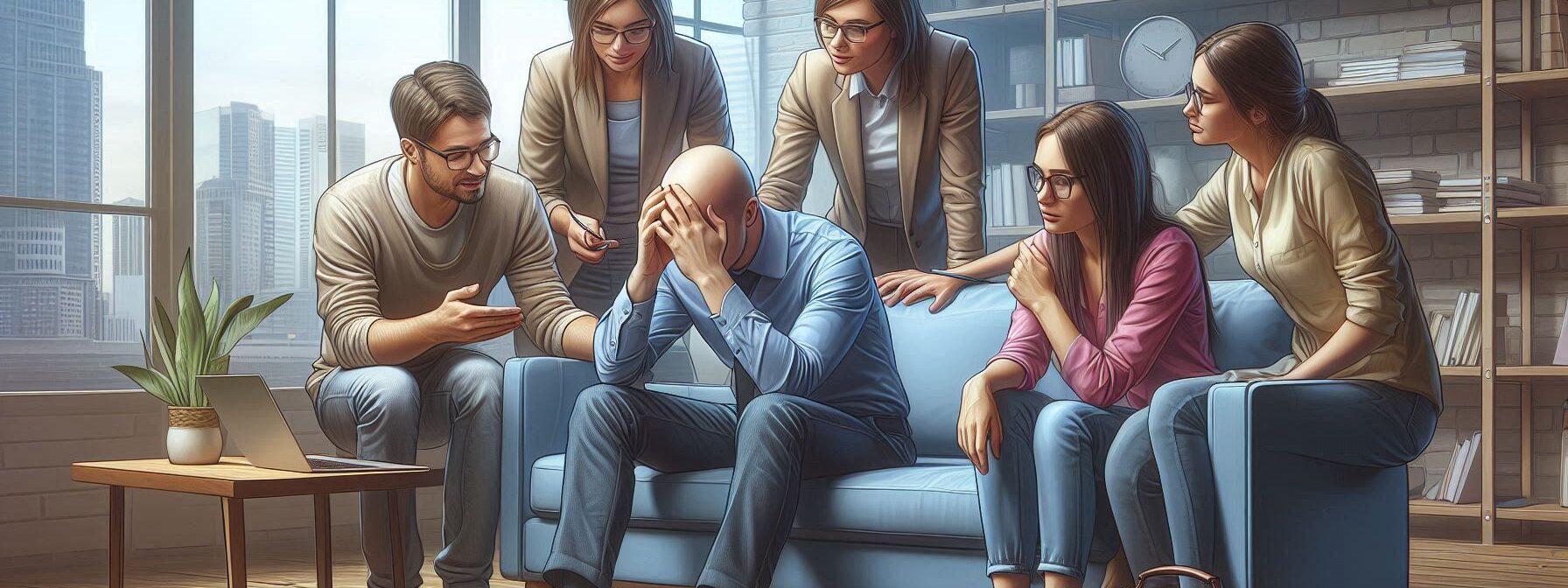When it comes to battling depression, you might think that the lone wolf approach is best.
You know, like Batman fighting crime all by himself while brooding in a dark cave. But let’s be real—who wants to spend their time alone in a cave?
I mean, have you ever tried to order pizza down there? It’s a logistical nightmare! Instead, community support can be your trusty sidekick, helping you navigate through those murky waters of mental health.
Top Takeaways and Key Concepts
- Reach out to friends, family, or online groups for shared understanding and support.
- Join local meetups or hobby-based clubs to build genuine, judgment-free connections.
- Discuss your goals with supportive peers to create accountability and motivation.
- Stay engaged in community activities to reduce loneliness and boost belonging.
- Celebrate every victory—big or small—with your support network to reinforce progress.
Summary of This Article
This article emphasizes the powerful role of community support in managing depression, contrasting it with the isolating “lone wolf” approach. It explains that surrounding yourself with empathetic people—whether friends, family, local groups, or online communities—provides comfort, encouragement, and accountability during difficult times. The piece highlights how shared experiences normalize mental health struggles, reduce stigma, and foster meaningful connections that combat loneliness. It also encourages readers to find their tribe through social activities, hobbies, or mental health forums and to celebrate small wins along the way. Ultimately, the message is clear: healing is easier when you don’t face it alone.
What Is Community Support?

By the way, community support isn’t just about having someone hold your hand while you cry over a sad movie (though that can definitely help).
It encompasses friends, family, local groups, and even online communities that come together to offer encouragement and understanding. Think of it as a warm blanket on a cold day—comforting and enveloping!
Community support allows us to share our experiences with others who get it. When you’re feeling low and someone else says, “Hey, I’ve been there too,” it’s like finding out your favorite celebrity also struggles with bad hair days. Suddenly, you don’t feel so alone!
Interestingly enough, this shared experience can create bonds stronger than the glue used in assembling IKEA furniture—which we all know is basically magical because nothing else seems to work!
These connections remind us that we’re not isolated islands but part of an archipelago where everyone occasionally gets lost at sea.
Why Is Community Support Important for Mental Health?
Let’s see why community support plays such a crucial role in overcoming depression. For starters, when people come together to share their struggles and triumphs, they normalize the conversation around mental health.
This is vital because stigma often makes people feel ashamed or embarrassed about seeking help—like showing up at a fancy party wearing socks with sandals (not cool).
Having supportive peers can significantly enhance our coping strategies. When I was going through my own tough times (and trust me; there were many), I found solace in talking with friends who had similar experiences.
We exchanged tips like seasoned warriors trading battle stories—“Oh yes! That Netflix series really helped me escape reality!” or “Try this meditation app; it’s more calming than watching paint dry!”
Plus, being part of a supportive community fosters accountability.
When we tell others about our goals—whether it’s exercising more or simply getting out of bed—we create gentle nudges from our cheerleaders who will remind us gently (or maybe not so gently) that it’s time to take action.
Finding Your Tribe
Now let’s talk about how to find your tribe because let’s face it: no one wants to wander around aimlessly looking for support like a lost puppy searching for treats.
Start by exploring local resources like therapy groups or workshops focused on mental wellness.
Many communities host meetups where folks gather over coffee and discuss everything from self-care practices to coping mechanisms—kind of like book clubs without the pressure of reading War and Peace!
Online platforms are also fantastic for connecting with others facing similar challenges. Social media groups dedicated specifically to mental health provide safe spaces for sharing thoughts without judgment—plus they often come with cute animal memes which always brighten my day!
And speaking of finding your tribe…don’t forget about hobbies! Joining clubs centered around activities you enjoy can lead you right into the arms of supportive individuals who understand what you’re going through—all while engaging in something fun!
Whether it’s painting classes or hiking groups (where no one judges how slowly you walk), these connections matter.
How Community Support Helps During Tough Times
Honestly, when life throws curveballs at us—and believe me; it will—it helps immensely knowing we have backup ready for action!
In moments when depression feels overwhelming—a bit like trying to swim through molasses—it can be comforting just knowing someone cares enough to check in on us.
Having supportive friends means having someone available during those late-night panic attacks when every thought feels magnified under harsh fluorescent lights (seriously—isn’t nighttime supposed to be relaxing?).
They might send texts saying things like “I’m here if you need me” or “Want some ice cream?” Because let’s face it: sometimes ice cream really does fix everything—even if only temporarily!
Moreover, participating actively within our communities fosters feelings of belongingness—a critical factor for anyone struggling with mental health issues.
Feeling connected combats loneliness effectively; after all, nobody wants their only friend being an imaginary pet goldfish named Bubbles!
Celebrating Progress Together
As we journey toward healing from depression alongside supportive communities around us—it becomes important not just focusing solely on struggles but also celebrating progress made along the way!
Share victories big or small! Did you manage two consecutive days without crying over spilled milk? Celebrate that milestone with cake—or better yet cupcakes because who doesn’t love cupcakes?!
Even little achievements deserve recognition—they act as reminders that recovery happens step-by-step rather than overnight transformations worthy of superhero movies.
Encouraging each other during good times strengthens relationships further too; laughter shared amongst friends creates bonds deeper than any therapy session could achieve alone (unless there’s karaoke involved…then anything goes!).
In conclusion: remember—you don’t have fight against depression solo-like Batman swinging through Gotham City—but instead surround yourself by those willing join forces alongside throughout this challenging adventure called life!
Suggested External Resources:
Mental Health America
https://www.mhanational.org/
National Alliance on Mental Illness
https://www.nami.org/
The Anxiety & Depression Association of America
https://adaa.org/
Support Groups Central
https://supportgroupscentral.com/
Frequently Asked Questions
What is community support in the context of depression?
Community support includes friends, family, local groups, or online communities that offer understanding, encouragement, and connection during difficult emotional periods.
How does community support help improve mental health?
Supportive connections reduce isolation, normalize struggles, provide encouragement, and help people build healthier coping habits through shared experience.
Can joining groups or clubs really make a difference?
Yes. Hobby groups, meetups, and wellness-focused gatherings foster belonging and create natural ways to connect with others who may share similar experiences.
How does sharing goals with others support recovery?
Sharing goals creates accountability and motivation, as supportive peers can encourage progress and remind you of your strengths when you feel discouraged.
What should I do if I feel too overwhelmed to reach out?
Start small by connecting with one trusted person or joining low-pressure online communities where you can participate at your own pace.
How can community support reduce loneliness?
Regular engagement with others builds a sense of belonging, reminds you that you’re not alone, and helps replace isolation with meaningful relationships.
Why is celebrating small victories with others important?
Sharing progress boosts confidence, reinforces positive habits, and strengthens emotional bonds within your support network.

Kevin Collier is a passionate mental health advocate and writer for SadFAQ.com, where he explores the complexities of depression and mental well-being. With a deep understanding of mental health challenges, Kevin provides compassionate insights and practical advice to help individuals navigate their journeys toward healing. His articles aim to destigmatize mental health issues, offering support and resources for those seeking to improve their emotional resilience. Committed to raising awareness and fostering open conversations, Kevin’s work empowers readers to prioritize their mental health and seek the support they deserve.




